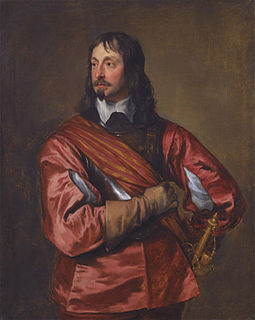Related Research Articles

Marston Moreteyne is a large English village and civil parish located on the A421 between Bedford and Milton Keynes in the county of Bedfordshire. The population was 4,560 at the 2001 census, and 4,556 at the 2011 census. The village is served by Millbrook railway station, approximately a mile away on the Marston Vale Line.

Anthony Sparrow (1612–1685) was an English Anglican priest. He was Bishop of Norwich and Bishop of Exeter.
Barten Holyday or Holiday (1593–1661) was a clergyman, author and poet. He was educated at Christ Church, Oxford and earned a Doctor of Divinity degree. He entered the clergy in 1615; he was appointed Archdeacon of Oxford by King Charles I in 1626. Technogamia was his only play. In 1618, the year it was produced, Holyday served as Sir Francis Stewart's chaplain on Stewart's embassy to Spain. Holyday translated the Odes of Horace and works of Juvenal and Persius, and wrote A Survey of the World, in Verse (1661), plus sermons and miscellaneous works. He was summed up by one commentator as "a good scholar, a shrewd critic, and a fair wit." His translations show strong fidelity to their originals, and have often been considered the best of his works. Samuel Johnson said in Idler 69 that his translations were those of "only a scholar and a critick" not a poet.
Francis Davies was a Welsh clergyman who was Bishop of Llandaff from 1667 until his death.
Timothy Halton D.D. (1632?–1704) was an English churchman and academic, Provost of Queen's College, Oxford from 1677.

Vice Admiral Sir John Mennes, was an English naval officer who went on to be Comptroller of the Navy.
Nicholas Dennys was an English politician who sat in the House of Commons from 1660 to 1678.

Reverend William Helyar, Doctor of Divinity, of Coker Court, East Coker, in Somerset, was Archdeacon of Barnstaple and a chaplain to Queen Elizabeth I.
John Pollard was a 16th-century Archdeacon of Wiltshire, Archdeacon of Cornwall, Archdeacon of Barnstaple and Archdeacon of Totnes.
Henry Squire was Archdeacon of Barnstaple from 1554 to 1582.
Joshua Tucker was Archdeacon of Barnstaple.
William Read was Archdeacon of Barnstaple from 1679 until 1703.
Thomas Lynford was Archdeacon of Barnstaple.
Lewis Stephens was Archdeacon of Barnstaple and Archdeacon of Chester.
William Cotton was the Archdeacon of Totnes.
George Snell was the Archdeacon of Totnes.
Thomas Southcote was an English landowner and politician who sat in the House of Commons from 1661 to 1664.

Sir Thomas Stucley of Affeton Castle, Devon was an English landowner and politician who sat in the House of Commons from 1661 to 1663. He fought in the Royalist army in the English Civil War.

Thomas Johnes, MA was a Welsh cleric of the Church of England, Archdeacon of Barnstaple from 1807 to 1826.

Benjamin Culme (1581-1657), Doctor of Divinity, was an English Anglican clergyman who served as Dean of St Patrick's Cathedral, Dublin, Ireland, from 1625 until 1649.
References
- ↑ "Memorials of Barnstaple; being an attempt to supply the want of a history of that ancient borough" Gribble, J.B: Barnstaple, J.Avery, 1830
- ↑ Timothy Raylor, Cavaliers, Clubs, and Literary Culture (1994), p. 50: "James Smith was baptized at Marston Moretaine, Bedfordshire, on 25 July 1605. His father, Thomas Smith, was parson of Marston and a man of some means. He owned lands and houses in Oxford, Berkshire, and Bedfordshire..."
- ↑ Alumni Oxonienses 1500-1714, Smith-Sowton
- ↑ "Alumni Oxonienses 1500-1714". British History Online. Retrieved 23 May 2012.
- ↑ Facetiae. Musarum deliciae: or, The muses recreation., Longman, Hurst, Rees, Orme, and Brown, 1817, intro, ppxxx.ff,
